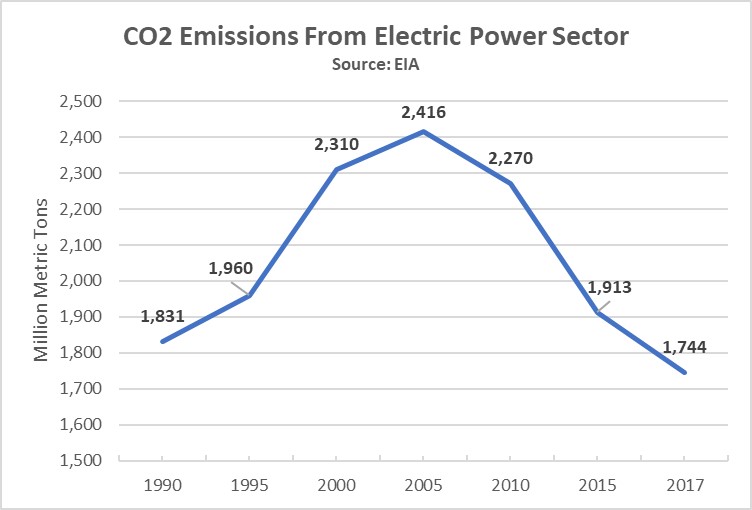With EPA unveiling its proposed new rule to reduce greenhouse gas emissions from power plants, there’s already lots of discussion of whether the proposal is an improvement over the rule it would replace – whether a regime may focus on the utility sector as a system or needs to focus on individual sources.
Be that as it may, we’ll go back to the main point we made amid discussion of the Obama administration’s Clean Power Plan (CPP), which EPA’s new proposal would replace:
Thanks to clean natural gas and its selection by the market as the leading fuel for electricity generation, U.S. carbon dioxide emissions from the power sector have plunged – without the CPP’s implementation. Here’s how U.S. Energy Information Administration data charts it:

Howard Feldman, API senior director of regulatory and scientific affairs:
“With or without the CPP, natural gas use in power generation, driven by market forces, is driving down U.S. total greenhouse gas emissions. Thanks largely to the increased use of natural gas in electricity generation, made possible by the revolution in shale energy production, we’ve seen carbon dioxide emissions drop substantially.”
We can’t over-emphasize the point. EPA’s new proposal will be debated thoroughly, yet the actual aim of this proposal and the CPP before it – reducing GHG emissions – is occurring in large part because of increased use of natural gas to fuel electricity generation.
Natural gas, as a driver of U.S. emissions reductions, which lead the world, is the critical context to discussion of EPA’s new proposal. Feldman says any replacement of the CPP should be fuel neutral – not favoring one generating fuel over others – allow states to rely on natural gas for compliance, provide them with flexibility, fully recognize the environmental benefits of natural gas and not adversely impact combined heat and power generation.
Abundant domestic natural gas has benefited consumers, made the United States a global leader in exporting liquefied natural gas – helping friends and allies abroad – while also playing the lead role in cutting GHG and other emissions. That progress is expected to continue with or without this proposed rule.
By Mark Green
Originally posted August 21, 2018
Energy Tomorrow is brought to you by the American Petroleum Institute (API), which is the only national trade association that represents all aspects of America’s oil and natural gas industry. Our more than 500 corporate members, from the largest major oil company to the smallest of independents, come from all segments of the industry. They are producers, refiners, suppliers, pipeline operators and marine transporters, as well as service and supply companies that support all segments of the industry.

